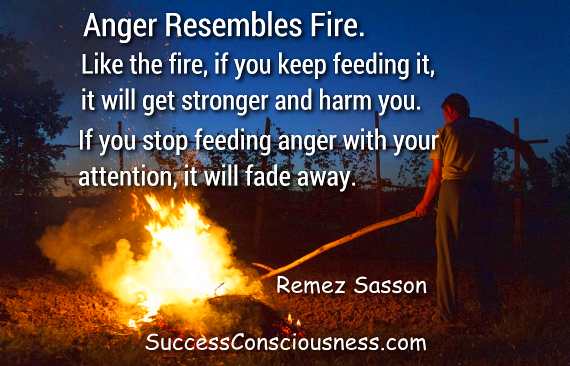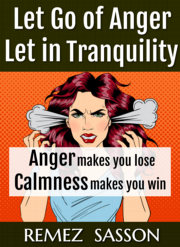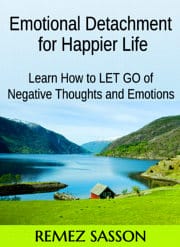
How often do you ask yourself: “How do I let go of anger?”
- Do you sometimes wonder how to let go of anger and resentment and how to remove them from your life?
- Do anger, resentment, and hurt feelings disturb your peace?
- Are you keeping anger smoldering within you?
- Can you let go of anger?
- Do you, like most people, create negative scenarios in your mind that make you restless, nervous, and unhappy?
Holding on to anger and allowing resentment and hurt feelings to grow can harm your blood pressure, mental health, and stress levels.
Holding grudges and staying angry affects your physical health.
Browse our online courses on meditation, positive thinking, overcoming procrastination, confidence, and freedom from distractions.
When angry, you hurt yourself, not the person who hurt you.
Examples of What Happens When You Do Not Let Go of Anger and Resentment
1. Do you tend to dwell on distressing events from your past and re-live them in your mind repeatedly? If you do, you might find it difficult to let go of the anger and resentment that they awaken within you.
2. If you get angry and resentful each time you see, meet, or think about people who have hurt your feelings, it would be difficult to let go of your anger and resentment toward them.
3. Having a guilty conscience about things you did in the past would make you carry this guilt within you. You will feel angry about them and hurt by them. You cannot change the past. It would be best to find a way to let these feelings go.
4. If you are too hard on yourself and do not forgive yourself for mistakes you made in the past, this attitude will make you unhappy, discontent, and sad.
5. I heard someone saying that he would never forgive his sister for not giving him a hand in time of need, and therefore, each time they meet, he cannot let go of his anger and resentment toward her.
6. Someone said that as a teenager, he was a bit overweight and was often ridiculed by his classmates. Nowadays, though he looks good, he still carries the hurt feelings he experienced in childhood and finds it difficult to let them go.
You can enjoy peace and happiness only when you learn to let go of your anger and the thoughts that awaken this feeling.
Related: Letting go quotes.
Whom Do You Hurt When You Are Angry?
- Whom do you hurt the most when you do not let go of anger, resentment, and hurt feelings? You hurt yourself.
- You hurt yourself when you tell yourself, “I will never forgive him for hurting my feelings.”
- Whom do you hurt when you refuse to forgive yourself for your past mistakes? It is you who gets hurt.
- You hurt yourself when you frequently dwell on unpleasant memories.
- It is you who suffers when you repeatedly re-live in your mind every detail of the distressing events you went through.
In all these situations, you must strive to let go of anger.
A great number of people feel that they cannot forget and let go of the past and move on to positive feelings.
This is because the negative feelings of anger, hurt, and lack of forgiveness are deeply rooted in them and dominate their life, moods, and actions.
Make a Decision to Let Go of Anger, Resentment, and Hurt Feelings
Some time ago, I watched an interview on TV with a successful football player. The interviewer asked him how he feels when he hears or reads harsh criticism about his performance on the field.
The football player said:
“At the beginning of my career, every criticism distressed me for days. I felt hurt and couldn’t stop occupying my mind with the unpleasant words I heard or read. I resented the people who criticized me and thought they were mean and wrong.”
“Today, I still read what people write about me, but their criticism does not affect me anymore.”
“I have decided not to let nasty remarks or ‘constructive advice’ take control over my life and my feelings. I have decided to let go of my anger, resentment, and hurt feelings because I choose happiness and peace of mind over anger and lack of inner peace.”
Related: Tips for Overcoming Anger and Finding Inner Peace
.
Don’t Feed Your Anger and Resentment
- How to let go of anger?
- How to let go of resentment?
- What to do to release and let go of hurt feelings?
If you wish to light a campfire, you start it with a few twigs, a few pages of a newspaper, and a box of matches. Afterward, to keep the fire burning, you need to feed it with more twigs and branches. Otherwise, the fire will go out.
- Anger resembles fire. Like the fire, if you keep feeding the fire of your anger, it will grow stronger and harm you.
- If you allow anger to occupy your attention, it will grow stronger.
- Anger will fade away if you stop feeding it with your attention.
The same goes for resentment and hurt feelings.
How do you stop feeding your anger and resentment?
You stop feeding them by denying them your attention, and this you can do by practicing emotional detachment. You can find all the guidance about emotional detachment in the book Emotional Detachment for Happier Life.
Emotional detachment is a skill that enables you to let go of distressing and harmful emotions, remain tranquil, and stop allowing negative emotions to upset you.
This skill protects you from getting irritated and agitated by what people say or do. It also helps you remain composed and levelheaded in unpleasant and difficult situations and when in the company of annoying people.
How to Let Go of Anger
As said earlier, if you do not feed anger and resentment with your attention, they will soon fade away and stop disturbing you. How do you do that?
1. Be Aware of what is going on in your mind
Try to be aware of what is going on in your mind by asking yourself the following questions:
- Do I get upset often?
- Do I tend to repeat over and again, in my mind, painful scenarios from the past?
- How often do I get angry often?
- Do I often feel resentment and other negative feelings?
If the answer is ‘yes’ to one or more of these questions, you need to learn to practice emotional detachment.
Related: Anger quotes.
2. Raising Doubts
It would be easier to exercise emotional detachment when you raise doubts about the necessity of your negative feelings and disturbing thoughts.
There are two options when you experience anger, resentment, or hurt feelings.
- You can allow yourself to become agitated and continue focusing and thinking about the negative feelings and the event that caused them.
- You can let go of your anger, resentment, and hurt feelings by stopping to give them your attention and mental energy. This would be easier if you ask yourself questions about them and raise doubts about their necessity.
Asking questions would take away the energy and intensity of your negative feelings because you would see how unreasonable and unnecessary they are.
With this simple yet effective technique, you would attain calmness and inner peace.
Here are the questions you need to ask yourself when negative emotions arise within you:
- Do I need the anger, distress, and unhappiness that I am experiencing?
- Does anger and resentment add any value to my life?
- Do my anger, resentment, and hurt feelings help me make wiser decisions, or do they cloud my better judgment?
- Is there any reason why I should carry with me any emotional burden, anger, resentment, hurt feelings, or guilty conscience?
- How to let go of anger? What should I do now?
The questions will make you realize that all the negative feelings you are experiencing are unnecessary and meaningless, making it easier for you to let them go.
Of course, this will not happen instantly. You will need to repeat this process often, and gradually, you will be able to replace anger, resentment, and hurt feelings with happiness and peace of mind.
3. Source of anger
Try identifying the source of your anger and what triggered it.
When you know the reasons, it will be easier to find solutions.
4. Forgiveness
Try to find forgiveness for the people who hurt you, no matter how hard it might be.
Forgiveness, honest and sincere forgiveness, might not be easy to express, but it will set your mind and feelings free from anger.
5. Reducing Stress
Finding ways to reduce stress will make you calmer and less prone to anger and resentment.
Less stress means more peacefulness.
6. Avoid Anger
This might not be easy, but you can, at least to a certain degree, avoid anger. The more you avoid it, the easier it will become to prevent it.
Always remember that expressing your anger might make you feel good for a short while, but it is bad in the long term. It is better to avoid it in the first place.
7. Deep breathing
When angry, stop what you are doing and take a few deep breaths. This will tend to reduce your anger.
8. Exercising
When angry, do a physical exercise such as walking, stretching, or exercising your body. This will set you free from the emotional turmoil.
Final Words
In conclusion, letting go of anger, resentment, and hurt feelings is a process that takes time, effort, and self-reflection. It requires a willingness to let go of negative emotions and move forward with a positive attitude.
To let go of these emotions, it’s important to acknowledge them and understand their root causes. This can be done through introspection, journaling, or seeking the help of a therapist.
Forgiveness is also an essential part of the process. Forgiving yourself and others for past mistakes or wrongdoings can bring closure and allow you to move on.
Letting go of anger negative emotions is not easy, but with patience and perseverance, it is possible to move forward and find peace.
Remember:
- letting go of resentment is within your reach!
- Letting go of resentment is an achievable goal!
- It is essential to give priority to learning how to let go of resentment and anger!
Don’t just ask yourself: “How do I let go of anger?” Implement the advice in this article in your daily life.
Browse our online courses on meditation, positive thinking, overcoming procrastination, motivation, confidence, and freedom from distractions.



